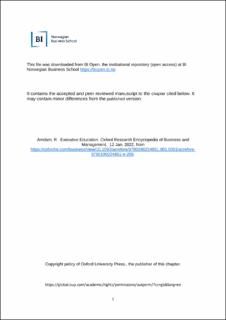| dc.description.abstract | Summary Executive education, defined as consisting of short, intensive non-degree programs offered by university business schools to attract people who are in or close to top executive positions, is a vital part of modern management education. The rationale behind executive education is different from that of the degree programs in business schools. While business schools enroll students to degree programs based on previous exams, degrees or entry tests, executive education typically recruits participants based on the their positions—or expected positions—in the corporate hierarchy. While degree programs grade their students and award them degrees, executive education offers courses that do not have exams and gives participants diplomas rather than degrees. Executive education expanded rapidly in the United States and globally after Harvard Business School launched its Advanced Management Program in 1945. In 1970, around 50 university business schools in the United States and business schools in at least 43 countries offered intense executive education programs lasting from three to 18 weeks. During the 1970s, business schools that offered executive education organized themselves into an association, first in the U.S. and later globally. From the 1980s, executive education met competition from the corporate universities organized by corporations themselves. This led the business schools to expand executive education in two directions: open programs that organized potential executives from a mixed group of companies, and tailor-made programs designed for individual companies. Despite being an essential part of the activities of business schools, few scholars have conducted research into executive education. Extant studies have been dominated by a focus on executive education in the context of the rigor-and-relevance debate that has accompanied the development of management education during the last 30 years. Other topics that are touched upon in research concern the content of courses, the appropriate pedagogical methods, and the effect of executive education on personal development. The current situation paves the way for some exciting new research topics. Among these are the role of executive education in creating, maintaining, and changing the business elite, the effect of executive education on socializing participants for managerial positions, and women and executive education. | en_US |
